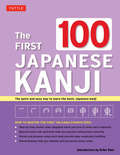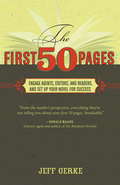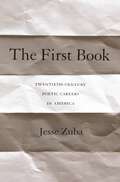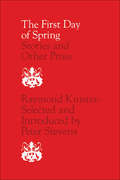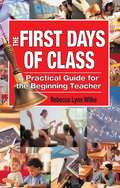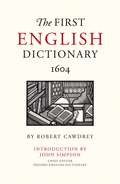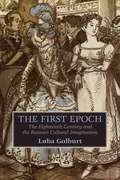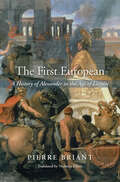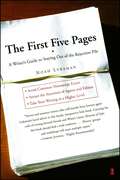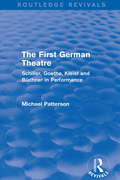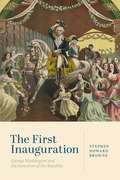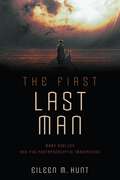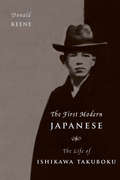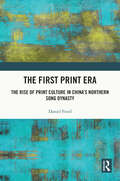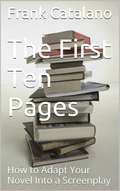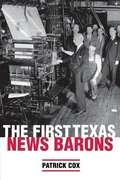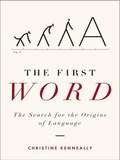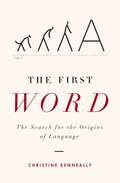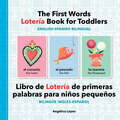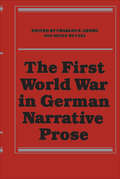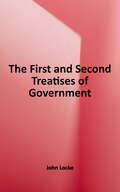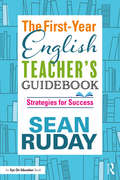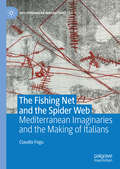- Table View
- List View
The First 100 Japanese Kanji
by Eriko SatoThis is an invaluable study guide for learning basic Japanese characters.The first 100 Japanese Kanji is intended for beginning students, or experienced speakers who need to practice their written Japanese. Kanji are an essential part of the Japanese language and together with kana (hiragana and katakana) comprise the written component of Japanese.This book presents the kanji characters that are most commonly used. They have been carefully selected for rapid and effective learning. Each kanji's readings, meanings, and common compounds are presented, and romanized pronunciations for English speakers (romanji) are included as well. Printed with gray guidelines, stroke order guides are designed to be traced over to teach students the standard sequence of strokes used to write each character. Three indexes at the back allow the characters to be looked up as with a dictionary or by their readings. Students who wish to practice writing kanji will find extra practice sheets available.This book includes:Step-by-step stroke order diagrams for each characterSpecial boxes with grid lines to practice writing charactersWords and phrases using each kanjiRomanizations (romanji) to help identify and pronounce every word
The First 50 Pages: Engage Agents, Editors and Readers, and Set Your Novel Up For Success
by Jeff GerkeWhether you're looking to get published or just hoping to hook your reader, first impressions are vital. Compelling opening scenes are the key to catching an agent of editor's attention, and are crucial for keeping your reader engaged.
The First Book: Twentieth-Century Poetic Careers in America
by Jesse Zuba"We have many poets of the First Book," the poet and critic Louis Simpson remarked in 1957, describing a sense that the debut poetry collection not only launched the contemporary poetic career but also had come to define it. Surveying American poetry over the past hundred years, The First Book explores the emergence of the poetic debut as a unique literary production with its own tradition, conventions, and dynamic role in the literary market. Through new readings of poets ranging from Wallace Stevens and Marianne Moore to John Ashbery and Louise Glück, Jesse Zuba illuminates the importance of the first book in twentieth-century American literary culture, which involved complex struggles for legitimacy on the part of poets, critics, and publishers alike. Zuba investigates poets' diverse responses to the question of how to launch a career in an increasingly professionalized literary scene that threatened the authenticity of the poetic calling. He shows how modernist debuts evoke markedly idiosyncratic paths, while postwar first books evoke trajectories that balance professional imperatives with traditional literary ideals. Debut titles ranging from Simpson's The Arrivistes to Ken Chen's Juvenilia stress the strikingly pervasive theme of beginning, accommodating a new demand for career development even as it distances the poets from that demand.Combining literary analysis with cultural history, The First Book will interest scholars and students of twentieth-century literature as well as readers and writers of poetry.
The First Day of Spring: Stories and Other Prose
by Raymond Knister Douglas Lochhead Peter StevensRaymond Knister had a strong sense of commitment both to his own career and to literature, particularly Canadian literature. In his ten working years he proved himself a prolific writer with wide-ranging interests. Although his work has appeared in many anthologies of Canadian literature, there remains a great deal of out of print or unpublished material. This volume brings together not only for his more well-known stories but also all his unpublished stories, a few travel pieces, and several examples of his literary criticism. Knister's stories are often strongly regional, and draw on rural Ontario for their setting and characters. Collected together here for the first time is a group of sketches dealing anecdotally with life in a village in southwestern Ontario. Also included are two stories arising from his experiences as a cab driver in Chicago in the 1920s, 'Innocent Man,' and 'Hackman's Night.' His essays focusing on literary matters and the traditions and problems of Canadian literature show a keenly critical mind. The First Day of Spring is an important rediscovery of one of Canada's best writers of the 1920s.
The First Days of Class: A Practical Guide for the Beginning Teacher
by Rebecca WilkeThis easy-to-use, step-by-step guide takes you through everything you need to know in your first days, weeks, and months as a new teacher, from developing your plan book and filing system in August to updating your grade book and celebrating your success in June. Chapters cover diverse learners, classroom organization and management, curriculum and instruction, lesson planning, grading systems, professional development, and more. Practical and specific advice helps you build the right classroom environment, create “essential file folders,” make a curriculum calendar, and even find the right wall art!The First Days of Class provides all the tools of the trade for new, substitute, returning, and emergency credential teachers, including: Short, easy-to-reference sections within each chapterTip boxes at the end of every chapterClassroom material samples, including “Our Classroom Rules” and a calendar of multicultural celebrationsResources that include a “A Teacher’s Ten Commandments,” Recommended Reading, and Educational websites.
The First English Dictionary 1604
by John Simpson Robert CawdreyEnglish is one of the most complicated languages to learn, and its constantly evolving vocabulary certainly doesn't help matters. For centuries, men and women have striven to chronicle and categorize the expressions of the English language, and Samuel Johnson is usually thought to be their original predecessor.But that lineage is wrong: Robert Cawdrey published his Table Alphabeticall in 1604, 149 years before Johnson's tome, and it is now republished here for the first time in over 350 years. This edition, prepared from the sole surviving copy of the first printing, documents Cawdrey's fascinating selection of 2,543 words and their first-ever definitions. Cawdrey subtitled his dictionary "for the benefit of Ladies, Gentlewomen, and other unskilled folk," for his aim was not to create a comprehensive catalog, but rather an in-depth guide for the lesser educated who might not know the "hard usual English wordes, borrowed from the Hebrew, Greeke, Latine, or French." Each entry reveals an intriguing facet of early modern life and the cultural mores of the time. There are familiar terms--"geometrie" was defined as "the art of measuring the earth," and a "concubine" was described as a "harlot, or light huswife"--and amusingly idiomatic definitions: "prodigall" is "too riotous in spending," while "hecticke" is "inflaming the hart, and soundest parts of the bodie."
The First Epoch
by Luba GolburtModern Russian literature has two "first" epochs: secular literature's rapid rise in the eighteenth century and Alexander Pushkin's Golden Age in the early nineteenth. In the shadow of the latter, Russia's eighteenth-century culture was relegated to an obscurity hardly befitting its actually radical legacy. And yet the eighteenth century maintains an undeniable hold on the Russian historical imagination to this day. Luba Golburt's book is the first to document this paradox. In formulating its self-image, the culture of the Pushkin era and after wrestled far more with the meaning of the eighteenth century, Golburt argues, than is commonly appreciated. Why did nineteenth-century Russians put the eighteenth century so quickly behind them? How does a meaningful present become a seemingly meaningless past? Interpreting texts by Lomonosov, Derzhavin, Pushkin, Viazemsky, Turgenev, Tolstoy, and others, Golburt finds surprising answers, in the process innovatively analyzing the rise of periodization and epochal consciousness, the formation of canon, and the writing of literary history.
The First European: A History of Alexander in the Age of Empire
by Pierre Briant“A truly remarkable forgotten chapter of European intellectual history, laid out with passion and integrity.” (The Wall Street Journal)The exploits of Alexander the Great were so remarkable that for centuries after his death the Macedonian ruler seemed a figure more of legend than of history. Thinkers of the European Enlightenment, searching for ancient models to understand contemporary affairs, were the first to critically interpret Alexander’s achievements. As Pierre Briant shows, in the minds of eighteenth-century intellectuals and philosophers, Alexander was the first European: a successful creator of empire who opened the door to new sources of trade and scientific knowledge, and an enlightened leader who brought the fruits of Western civilization to an oppressed and backward “Orient.”In France, Scotland, England, and Germany, Alexander the Great became an important point of reference in discourses from philosophy and history to political economy and geography. Voltaire, Montesquieu, and Robertson asked what lessons Alexander’s empire-building had to teach modern Europeans. They saw the ancient Macedonian as the embodiment of the rational and benevolent Western ruler, a historical model to be emulated as Western powers accelerated their colonial expansion into Asia, India, and the Middle East.“This important work. . . . confirms once more that the life-trajectory of the Macedonian conqueror remains an inexhaustible cultural resource.” —Sanjay Subrahmanyam, University of California, Los Angeles, author of Empires Between Islam and Christianity
The First Five Pages
by Noah LukemanIF YOU'RE TIRED OF REJECTION, THIS IS THE BOOK FOR YOU. Whether you are a novice writer or a veteran who has already had your work published, rejection is often a frustrating reality. Literary agents and editors receive and reject hundreds of manuscripts each month. While it's the job of these publishing professionals to be discriminating, it's the job of the writer to produce a manuscript that immediately stands out among the vast competition. And those outstanding qualities, says New York literary agent Noah Lukeman, have to be apparent from the first five pages. The First Five Pagesreveals the necessary elements of good writing, whether it be fiction, nonfiction, journalism, or poetry, and points out errors to be avoided, such as* A weak opening hook* Overuse of adjectives and adverbs* Flat or forced metaphors or similes* Melodramatic, commonplace or confusing dialogue* Undeveloped characterizations and lifeless settings* Uneven pacing and lack of progressionWith exercises at the end of each chapter, this invaluable reference will allow novelists, journalists, poets and screenwriters alike to improve their technique as they learn to eliminate even the most subtle mistakes that are cause for rejection. The First Five Pageswill help writers at every stage take their art to a higher -- and more successful -- level.
The First Frame
by Pannill CampIn the late eighteenth century, a movement to transform France's theatre architecture united the nation. Playwrights, philosophers, and powerful agents including King Louis XV rejected the modified structures that had housed the plays of Racine and Molière, and debated which playhouse form should support the future of French stagecraft. In The First Frame, Pannill Camp argues that these reforms helped to lay down the theoretical and practical foundations of modern theatre space. Examining dramatic theory, architecture, and philosophy, Camp explores how architects, dramatists, and spectators began to see theatre and scientific experimentation as parallel enterprises. During this period of modernisation, physicists began to cite dramatic theory and adopt theatrical staging techniques, while playwrights sought to reveal observable truths of human nature. Camp goes on to show that these reforms had consequences for the way we understand both modern theatrical aesthetics and the production of scientific knowledge in the present day.
The First German Theatre (Routledge Revivals): Schiller, Goethe, Kleist and Büchner in Performance
by Michael PattersonFirst published in 1990. The book surveys of the development of German theatre from a market sideshow into an important element of cultural life and political expression. It examines Schiller as ‘theatre poet’ at Mannheim, Goethe’s work as director of the court theatre at Weimar, and then traces the rapid commercial decline that made it difficult for Kleist and impossible for Büchner to see their plays staged in their own lifetime. Four representative texts are analysed: Schiller’s The Robbers, Goethe’s Iphigenia on Tauris, Kleist’s The Prince of Homburg, and Büchner’s Woyzeck. This title will be of interest to students of theatre and German literature.
The First Inauguration: George Washington and the Invention of the Republic
by Stephen Howard Browne"Among the vicissitudes incident to life, no event could have filled me with greater anxieties than that of which the notification was transmitted by your order, and received on the fourteenth day of the present month." With these words to the assembled members of the Senate and House of Representatives on April 30, 1789, George Washington inaugurated the American experiment. It was a momentous occasion and an immensely important moment for the nation. Never before had a people dared to invent a system of government quite like the one that Washington was preparing to lead, and the tensions between hope and skepticism ran high.In this book, distinguished scholar of early America Stephen Howard Browne chronicles the efforts of the first president of the United States of America to unite the nation through ceremony, celebrations, and oratory. The story follows Washington on his journey from Mount Vernon to the site of the inauguration in Manhattan, recounting the festivities—speeches, parades, dances, music, food, and flag-waving—that greeted the president-elect along the way. Considering the persuasive power of this procession, Browne captures in detail the pageantry, anxiety, and spirit of the nation to arrive at a more nuanced and richly textured perspective on what it took to launch the modern republican state. Compellingly written and artfully argued, The First Inauguration tells the story of the early republic—and of a president who, by his words and comportment, provides a model of leadership and democratic governance for today.
The First Inauguration: George Washington and the Invention of the Republic
by Stephen Howard Browne“Among the vicissitudes incident to life, no event could have filled me with greater anxieties than that of which the notification was transmitted by your order, and received on the fourteenth day of the present month.”With these words to the assembled members of the Senate and House of Representatives on April 30, 1789, George Washington inaugurated the American experiment. It was a momentous occasion and an immensely important moment for the nation. Never before had a people dared to invent a system of government quite like the one that Washington was preparing to lead, and the tensions between hope and skepticism ran high.In this book, distinguished scholar of early America Stephen Howard Browne chronicles the efforts of the first president of the United States of America to unite the nation through ceremony, celebrations, and oratory. The story follows Washington on his journey from Mount Vernon to the site of the inauguration in Manhattan, recounting the festivities—speeches, parades, dances, music, food, and flag-waving—that greeted the president-elect along the way. Considering the persuasive power of this procession, Browne captures in detail the pageantry, anxiety, and spirit of the nation to arrive at a more nuanced and richly textured perspective on what it took to launch the modern republican state. Compellingly written and artfully argued, The First Inauguration tells the story of the early republic—and of a president who, by his words and comportment, provides a model of leadership and democratic governance for today.
The First Last Man: Mary Shelley and the Postapocalyptic Imagination
by Eileen M. HuntBeyond her most famous creation—the nightmarish vision of Frankenstein’s Creature—Mary Shelley’s most enduring influence on politics, literature, and art perhaps stems from the legacy of her lesser-known novel about the near-extinction of the human species through war, disease, and corruption. This novel, The Last Man (1826), gives us the iconic image of a heroic survivor who narrates the history of an apocalyptic disaster in order to save humanity—if not as a species, then at least as the practice of compassion or humaneness. In visual and musical arts from 1826 to the present, this postapocalyptic figure has transmogrified from the “last man” into the globally familiar filmic images of the “invisible man” and the “final girl.”Reading Shelley’s work against the background of epidemic literature and political thought from ancient Greece to Covid-19, Eileen M. Hunt reveals how Shelley’s postapocalyptic imagination has shaped science fiction and dystopian writing from H. G. Wells, M. P. Shiel, and George Orwell to Octavia Butler, Margaret Atwood, and Emily St. John Mandel. Through archival research into Shelley’s personal journals and other writings, Hunt unearths Shelley’s ruminations on her own personal experiences of loss, including the death of young children in her family to disease and the drowning of her husband, Percy Bysshe Shelley. Shelley’s grief drove her to intensive study of Greek tragedy, through which she developed the thinking about plague, conflict, and collective responsibility that later emerges in her fiction. From her readings of classic works of plague literature to her own translation of Sophocles’s Oedipus Rex, and from her authorship of the first major modern pandemic novel to her continued influence on contemporary popular culture, Shelley gave rise to a tradition of postapocalyptic thought that asks a question that the Covid-19 pandemic has made newly urgent for many: What do humans do after disaster?
The First Modern Japanese: The Life of Ishikawa Takuboku (Asia Perspectives: History, Society, and Culture)
by Donald KeeneMany books in Japanese have been devoted to the poet and critic Ishikawa Takuboku (1886–1912). Although he died at the age of twenty-six and wrote many of his best-known poems in the space of a few years, his name is familiar to every literate Japanese. Takuboku's early death added to the sad romance of the unhappy poet, but there has been no satisfactory biography of his life or career, even in Japanese, and only a small part of his writings have been translated. His mature poetry was based on the work of no predecessor, and he left no disciples. Takuboku stands unique.Takuboku's most popular poems, especially those with a humorous overlay, are often read and memorized, but his diaries and letters, though less familiar, contain rich and vivid glimpses of the poet's thoughts and experiences. They reflect the outlook of an unconstrained man who at times behaved in a startling or even shocking manner. Despite his misdemeanors, Takuboku is regarded as a national poet, all but a saint to his admirers, especially in the regions of Japan where he lived. His refusal to conform to the Japan of the time drove him in striking directions and ranked him as the first poet of the new Japan.
The First Print Era: The Rise of Print Culture in China’s Northern Song Dynasty
by Daniel FriedThe First Print Era examines the rise of print culture during China’s Northern Song Dynasty (960–1127). Bringing together often-overlooked primary sources from the period and scholarship on many individual topics in Song print history, the book offers the first extended narrative in English of how print became entrenched as a sustained mode of textual dissemination in China. While discussing technical innovations and the growth of the print industry, the book focuses on how the rise of print affected several indispensable elements of Song intellectual culture: the expansion of the exam system, the canonization of Tang and earlier models, the rise of antiquarianism and connoisseurship, the birth of Neo-Confucianism as a new intellectual force, the growth of a new literati culture and new forms of literary production and critique, and the development of calligraphy as an art form that could be taught, critiqued, and divided into schools. Overall, the book describes a process by which print publication moved from a highly centralized state enterprise, back to expanded elite use, and eventually towards the popular print markets that would create new forms of expression during the Southern Song and Yuan dynasties. This book will be an essential read for students and scholars of Asian studies, Medieval studies, and those with a focus on print history and Chinese studies.
The First Ten Pages (How to Adapt Your Novel Into a Screenplay #4)
by Frank CatalanoHOW TO HAVE A STRONG OPENING FOR YOUR SCREENPLAY SO THEY WILL READ IT TO THE END. THE FIRST TEN PAGES was first presented as part of the 25th Annual Writer's Conference sponsored by San Diego State University on February 6 through the 8th, 2009 at the Double Tree Hilton Hotel in Mission Hills, California. The following transcript was presented and recorded by Frank Catalano as part of the programs offered at the conference. The book ibased partly upon that presentation, focuses on the adaptation of an existing novel into a screenplay for presentation as a motion picture, television program or Internet content. Writers of fiction and non-fiction and industry professionals from the publishing business primarily attended the 25th Annual Writer's Conference. Mr. Catalano's seminars focused upon those writers seeking to adapt their novels into screenplays. The complete list of seminar presentations by Frank Catalano for this conference is: BOOK 1: WRITE GREAT CHARACTERS IN THE FIRST TEN PAGES BOOK 2: WRITING ON YOUR FEET - IMPROVISATIONAL TECHNIQUES FOR WRITERS - Part 1 BOOK 3: START YOUR STORY AT THE END BOOK 4: THE FIRST TEN PAGES BOOK 5: BOOK TO SCREEN BOOK 6: ACTING IT OUT - IMPROVISATIONAL TECHNIQUES FOR WRITERS - Part 2 BOOK 7: WRITE GREAT DIALOGUE
The First Texas News Barons
by Patrick Cox"Those interested in how power is used& #151as well as who gets to wield it-- will enjoy this contribution to the study of journalism, often called the rough draft of history. " -- East Texas Historical Association Newspaper publishers played a crucial role in transforming Texas into a modern state. By promoting expanded industrialization and urbanization, as well as a more modern image of Texas as a southwestern, rather than southern, state, news barons in the early decades of the twentieth century laid the groundwork for the enormous economic growth and social changes that followed World War II. Yet their contribution to the modernization of Texas is largely unrecognized. This book investigates how newspaper owners such as A. H. Belo and George B. Dealey of the Dallas Morning News, Edwin Kiest of the Dallas Times Herald, William P. Hobby and Oveta Culp Hobby of the Houston Post, Jesse H. Jones and Marcellus Foster of the Houston Chronicle, and Amon G. Carter Sr. of the Fort Worth Star-Telegram paved the way for the modern state of Texas. Patrick Cox explores how these news barons identified the needs of the state and set out to attract the private investors and public funding that would boost the state's civic and military infrastructure, oil and gas industries, real estate market, and agricultural production. He shows how newspaper owners used events such as the Texas Centennial to promote tourism and create a uniquely Texan identity for the state. To balance the record, Cox also demonstrates that the news barons downplayed the interests of significant groups of Texans, including minorities, the poor and underemployed, union members, and a majority of women.
The First Word
by Christine KenneallyAn accessible exploration of a burgeoning new field: the incredible evolution of language The first popular book to recount the exciting, very recent developments in tracing the origins of language, The First Word is at the forefront of a controversial, compelling new field. Acclaimed science writer Christine Kenneally explains how a relatively small group of scientists that include Noam Chomsky and Steven Pinker assembled the astounding narrative of how the fundamental process of evolution produced a linguistic ape?in other words, us. Infused with the wonder of discovery, this vital and engrossing book offers us all a better understanding of the story of humankind. .
The First Word: The Search for the Origins of Language
by Christine KenneallyThis is about the quest for the origins of human language, in two sections. The first explains how language developed and the processes of evolution. The second tells why scientists are at last able to explore the subject.
The First Words Lotería Book for Toddlers English-Spanish Bilingual: Libro de Lotería de primeras palabras para niños pequeños Bilingüe Inglés-Español
by Angélica LópezHelp babies and toddlers learn new words through this classic Mexican game The best time for kids to start learning a second language is right now. And the best way to do it? Through the power of play! Inspired by the traditional game Lotería, also known as Mexican bingo, this book makes it a joy for babies and toddlers to start building their English and Spanish vocabularies. What sets this Lotería book apart from other bilingual books for toddlers: 44 beginner words—From el gallo (the rooster) to la luna (the moon), little ones will discover 44 new words as they learn to play this classic game of chance. Bilingual learning—Every page features a single image, identified in both English and Spanish, ensuring kids can make the connection between the picture and its meaning. Adorable artwork—An array of colorful images based on traditional Lotería artwork are sure to keep babies and toddlers engaged, learning, and eager to turn the pages. Make sure your little one begins their bilingual learning early with this top choice in Spanish baby books.
The First World War in German Narrative Prose
by Charles N. Genno Heinz WetzelThis collection of eight essays in honour of the distinguished Canadian Germanist G.W. Field treats themes in German narrative prose of the First World War, the pre-war era, and the earliest of the Weimar Republic. The aim of the book is not to present a comprehensive study of the field, but rather to shed new light on specific problems. The essays are organized in the historical sequence of the events and situations to which they are related. The topics include discussions of the concept of war as presented by Robert Musil in Der Mann hone Eigenschaften; the treatment of war as a catalyst by the Expressionist writers Carl Sternheim and Leonhard Frank; the preservation of values in the face of war as dealt in Hesse's Demian; and an exploration of the effects of war on the individual and social values in the works of Salomo Friedländer and Alfred Döblin. An essay on H.G. Well's Mr. Britling Sees It Through helps to clarify the ways in which the reaction of German writers to the war may be viewed as specifically German by providing an outsider's point of view. The final chapter, a survey of the most recent literature on the topic, shows how much World War I lives on in the minds of German writers as the great turning point in German political and cultural history.
The First and Second Treatises of Government
by John LockeLocke's two groundbreaking treatises regarding good governance are present here in this complete edition. At the time these treatises were written, English politics had undergone decades of upheaval in the wake of the English Civil War. <p><p> When Dutch monarch William of Orange ascended to the English throne in the Glorious Revolution of 1688, burning questions over the best form of governance for England were prominent in the intelligentsia of the era. It was a time when England grappled with its incremental transition from monarchy to early forms of democracy and right to vote, where dynastic monarchy and religious theory still held considerable power over the formation of the state. <p><p> In the first treatise Locke proceeds to attack and dissect his prominent contemporary Robert Filmer, who was broadly in favour of absolute monarchy under the principle of divine right. The allusions to the Biblical Adam, wherein the monarch can be intimated as a continuation of the first man ever created, are debunked by Locke who asserts that God never asserted that one man had province to rule over all other human beings. Supporting his argument with known history, Locke concludes that no king over the centuries had asserted to be the heir of Adam and thereby the rightful ruler of a country. <p><p> In the second treatise Locke turns to a different topic - that of the state of nature. He discusses how humanity may have behaved prior to the establishment of formal societies, and concludes that humanity - even without an established government in place - had never been truly lawless even when freedom was at its farthest extent. In arguing against the tyranny of absolute monarchy, while acknowledging the advantages of humanity's freedom in its natural ungoverned state, Locke arrives at his conclusion: a democratically elected government, whereby humans are accorded freedoms but must conform to the rule of law, is the most advantageous type of government to which humans can aspire. <p><p> Lauded as a classic of political philosophy, the treatises by Locke are a common requirement in various educational courses concerning political science and philosophy to this day. While steeped in the historical realities of the late 17th century, the arguments Locke composes for governance favourable to the people and their country's development were immensely influential on political theory during and after the Enlightenment era.
The First-Year English Teacher's Guidebook: Strategies for Success
by Sean RudayThe First-Year English Teacher’s Guidebook offers practical advice and recommendations to help new English teachers thrive in the classroom. Each chapter introduces a concept crucial to a successful first year of teaching English and discusses how to incorporate that concept into your daily classroom practice. You’ll find out how to: Clearly communicate instructional goals with students, parents, and colleagues; Incorporate students' out-of-school interests into the curriculum; Use assignment-specific rubrics to respond to student writing in meaningful ways; Integrate technology into ELA instruction; Conduct student-centered writing conferences; Make time for self-care and self-improvement; and much, much more. Additionally, the guidebook provides a number of forms, templates, graphic organizers, and writing prompts that will enable you to put the author’s advice into immediate action. These tools are available for download on the book’s product page: www.routledge.com/9781138495708.
The Fishing Net and the Spider Web: Mediterranean Imaginaries and the Making of Italians (Mediterranean Perspectives)
by Claudio FoguThis book explores the role of Mediterranean imaginaries in one of the preeminent tropes of Italian history: the formation or 'making of' Italians. While previous scholarship on the construction of Italian identity has often focused too narrowly on the territorial notion of the nation-state, and over-identified Italy with its capital, Rome, this book highlights the importance of the Mediterranean Sea to the development of Italian collective imaginaries. From this perspective, this book re-interprets key historical processes and actors in the history of modern Italy, and thereby challenges mainstream interpretations of Italian collective identity as weak or incomplete. Ultimately, it argues that Mediterranean imaginaries acted as counterweights to the solidification of a 'national' Italian identity, and still constitute alternative but equally viable modes of collective belonging.
